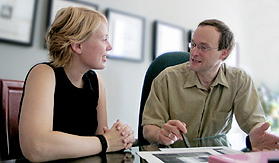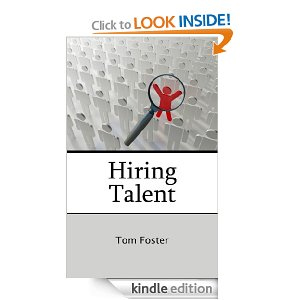We are gathering the next group for our online program Hiring Talent, which kicks off January 25, 2013. As this economy (slowly) recovers, your next hires are critical. This is not a time to be casual about the hiring process. Mistakes are too expensive and margins are too thin.
This is the only program that combines an understanding of Levels of Work with Behavioral Interviewing. The research on Levels of Work is powerful science. The discipline of behavioral interviewing is the methodology for its application. This is the only program that puts these two ideas together in a practical framework for managers faced with Hiring Talent.
Purpose of this program – to train managers and HR specialists in the discipline of conducting more effective interviews in the context of a managed recruiting process.

Candidate Interview
How long is the program? We have streamlined the program so that it can be completed in six weeks. We have also added a self-paced feature so participants can work through the program even faster.
How do people participate in the program? This is an online program conducted by Tom Foster. Participants will be responsible for online assignments and participate in online facilitated discussion groups with other participants. This online platform is highly interactive. Participants will interact with Tom Foster and other participants as they work through the program.
Who should participate? This program is designed for Stratum III and Stratum IV managers and HR managers who play active roles in the recruiting process for their organizations.
What is the cost? The program investment is $499 per participant.
When is the program scheduled? Pre-registration is now open. The program is scheduled to kick-off February 1, 2013.
How much time is required to participate in this program? Participants should reserve approximately 2 hours per week. This program is designed so participants can complete their assignments on their own schedule anytime during each week’s assignment period.
Pre-register now. No payment due at this time.
January 25, 2013
February 1, 2013
Week One – Role Descriptions – It’s All About the Work
- What we are up against
- Specific challenges in the process
- Problems in the process
- Defining the overall process
- Introduction to the Role Description
- Organizing the Role Description
- Defining Tasks
- Defining Goals
- Identifying the Level of Work
Week Two
- Publish and discuss Role Descriptions
Week Three – Interviewing for Future Behavior
- Creating effective interview questions
- General characteristics of effective questions
- How to develop effective questions
- How to interview for attitudes and non-behavioral elements
- How to interview for Time Span
- Assignment – Create a bank of interview questions for the specific role description
Week Four
- Publish and discuss bank of interview questions
Week Five – Conducting the Interview
- Organizing the interview process
- Taking Notes during the process
- Telephone Screening
- Conducting the telephone interview
- Conducting the face-to-face interview
- Working with an interview team
- Compiling the interview data into a Decision Matrix
- Background Checks, Reference Checks
- Behavioral Assessments
- Drug Testing
- Assignment – Conduct a face-to-face interview
Week Six
- Publish and discuss results of interview process
Pre-registration is now open for this program. No payment is due at this time.

